A SHOW FOR FOREVER
That songwriters and lyricists Benj Pasek and Justin Paul — critical darlings for La La Land (film), Dogfight (Off-Broadway), and A Christmas Story (Broadway) — are in effect the Rodgers and Hammerstein of this generation is as alarming as climate change. At least their true colors as creators of whitewashed pop and unintelligent lyrics was duly noted for the tepid movie musical The Greatest Showman, but that didn’t stop it from being the fifth-highest grossing live-action musical of all time.
The 33-year-olds, who have been writing together since their years in college, have been awarded and praised to a puzzling degree, and with Disney taking the duo (known as Pasek & Paul) under its wing for the upcoming live-action remakes of Snow White and Aladdin, it looks like their kind of music — forgettable, sing-song, repetitious recitative numbers with pop-rock flavor — is here to stay.
Which brings us to the miracle that is Dear Evan Hansen, the justifiably praised Tony-winning show which began at the Ahmanson Theatre in Los Angeles last Friday — the second stop of it’s first of possibly five or six national tours to come. Even without a great score by Pasek & Paul, this justifiably crowd-pleasing juggernaut is poised to become the new Hamilton, shattering all weekly box office revenue records in Ahmanson and Center Theatre Group’s over 50-year history even before the celebrity-studded opening night.
I specifically avoided the Original Broadway Cast recording until now, so I was shocked to discover that this isn’t really a musical. It’s a thoroughly fantastic play with music. Pasek & Paul’s songs do advance plot and musicalize emotions when needed, but there are only one or two very good songs (“For Forever,” “Good for You”); nothing stands out or could survive outside the show. Written in the style of Brian Yorkey and Tom Kitt (Next to Normal), the unamazing, unoriginal, unremarkable score means you can avoid the album. Their effort works remarkably well within the context of the show — made touching by Alex Lacamoire’s sensitive orchestrations — but it makes Legally Blonde and Heathers sound like Sondheim in comparison.
As with Hair 50 years ago, Evan Hansen has hit the jugular of today’s teenage zeitgeist while reminding the rest of us just how difficult and damaging adolescence can be. Oh, sure, parents still don’t understand kids, but today’s fast-paced millennials — a generation lost in cyberspace — are experiencing a distressing increase of pressure as they grapple with information overload, out-of-control capitalism, overpopulation density, political polarization, and an ever-heating planet.
As such, Evan Hansen (Ben Levi Ross, utterly convincing as an awkward teen) — who has trouble fitting in and authentically communicating what he’s experiencing — perfectly represents the many who suffer from neurosis, anxiety, depression, and other disorders on the ADHD and autism spectrum. We don’t know Evan’s alphabet-soup diagnosis, but he’s taking medication. Following the advice of Evan’s therapist, his single mother, Heidi (Jessica Phillips), encourages him to write a letter of encouragement to himself. The letter he writes is not positive, it’s a cry for help — to be connected and loved, especially by a girl he adores named Zoe (Maggie McKenna). Zoe’s brother Connor (Marrick Smith), a toxic misfit loner and Evan’s classmate, discovers the letter at school, berates Evan and soon thereafter kills himself. (Much of this happens early on in the show, so no spoilers here.)
When Connor’s parents (Christiane Noll and Aaron Lazar) find Evan’s letter, they assume it’s a suicide note from Connor to Evan, but why had they never heard of Evan before? Attempting to mollify Connor’s grieving folks (not Zoe; she hated her brother), Evan begins spinning a web of lies, aided by an acerbic family friend and loner, Jared (Jared Goldsmith), who concocts a trail of fabricated e-mails as proof of the friendship that never happened. Developing a relationship with Zoe and finding a familial bond he sorely lacks at home, Evan’s lies bleed over into school, thanks to a pushy loner, Alana (Phoebe Koyabe) — who starts an on-line club dedicated to Connor’s memory — and a memorial speech by Evan that becomes viral on YouTube. (Did you notice that four of the lead characters are loners?)
Ross’s quirky, layered, blazing, emotionally grounded performance as Evan is, frankly, remarkable. Almost always on stage, the 20-year-old handles the multifarious notes over and over again (the role is so demanding that there’s an alternate Evan, Stephen Christopher Anthony, half the performances: Wed, Thurs, Sat matinees and Sun nights).
But what I’m really left with is Steven Levenson‘s amazingly compelling and always surprising book, which is pocked with ever-changing developments, just like an adolescent. A lot is revealed by what isn’t said among the realistic teenage patois. The raw and unpolished characters are perfectly imperfect and nuanced in such a way that it aids both the actors and audience to tap into the well of vulnerability that occurs when trying to connect while forming life skills, the latter of which — let’s face it — most of us are lacking.
While the 150-minute two-act flies by, thanks to Michael Greif’s patient but compelling direction, it’s possible the show could have more impact in houses smaller than the vast spaces booked for national tours; for those seated farther back, the only time you can truly see Evan’s face is when it’s rarely projected on one of the many rolling screens (simple sets by David Korins; complex projections by Peter Migrini; and sensitive lighting by Japhy Weideman).
I dare anyone not to get misty-eyed sometime during the show. It’s one of the most haunting depictions of teenagers — and their unassailable confusion, chaos, and disconnection — that I have ever seen in the theater.
photos by Matthew Murphy
Dear Evan Hansen
reviewed at Ahmanson Theatre, 135 N. Grand Ave.
ends on November 25, 2018 in Los Angeles
for tickets ($99-$285), call 213.972.4400 or visit CTG
TOUR CONTINUES THROUGH SEPT. 2019 (or maybe for forever)
for dates and cities, visit Evan Hansen

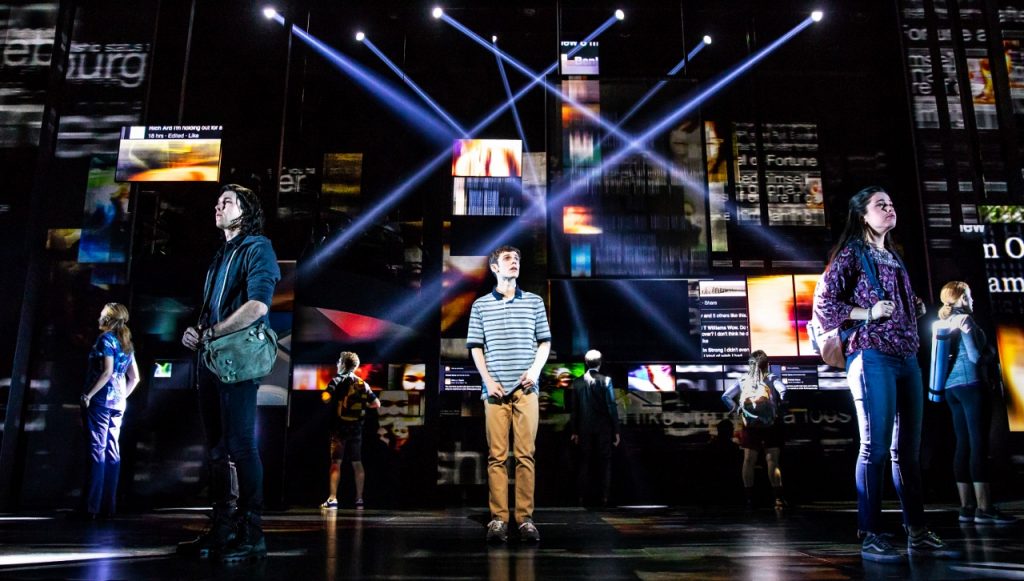
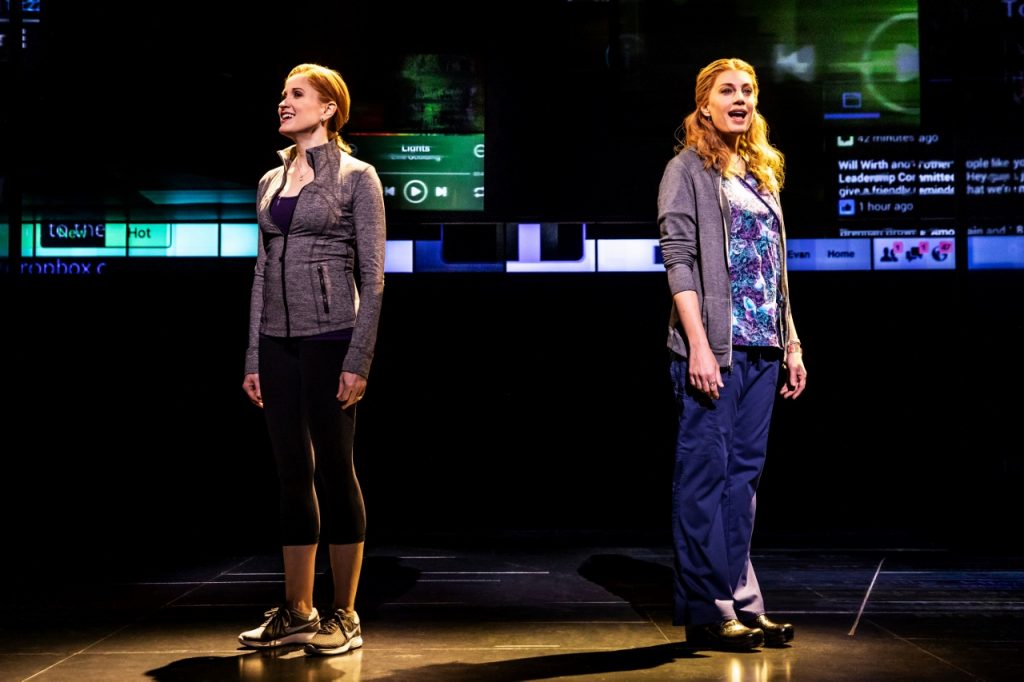
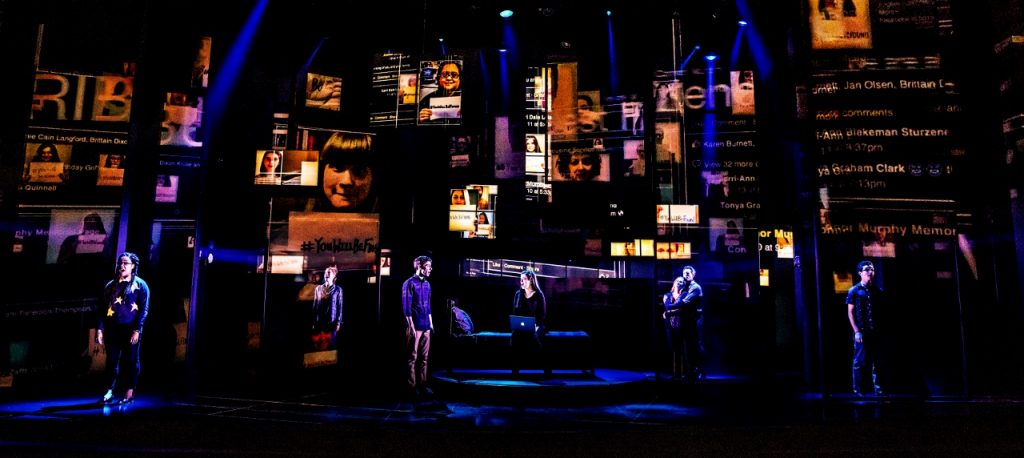
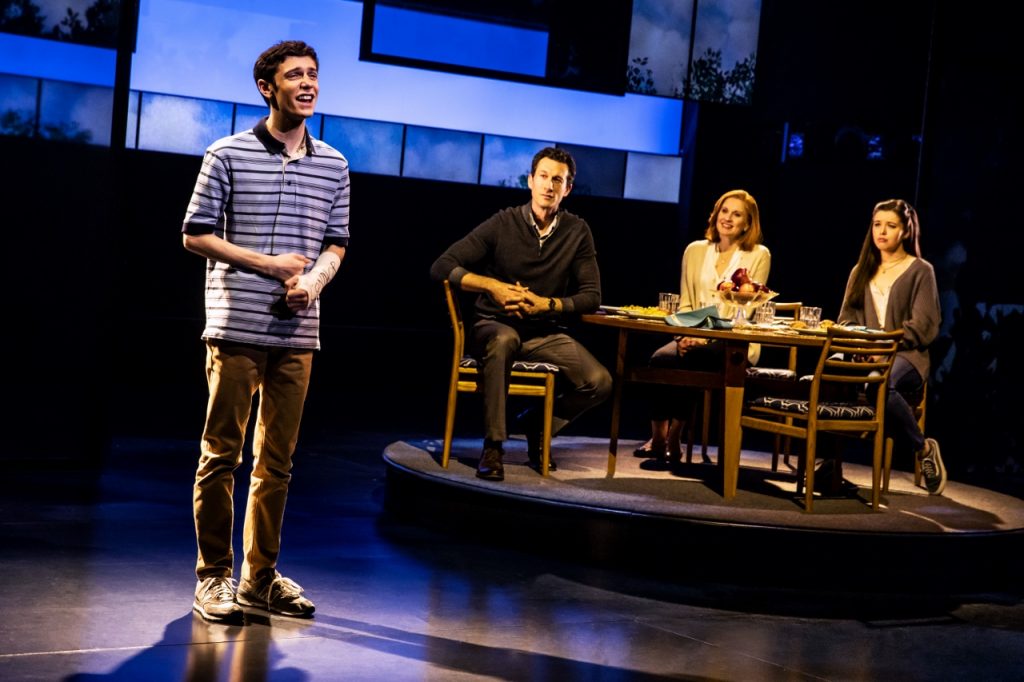
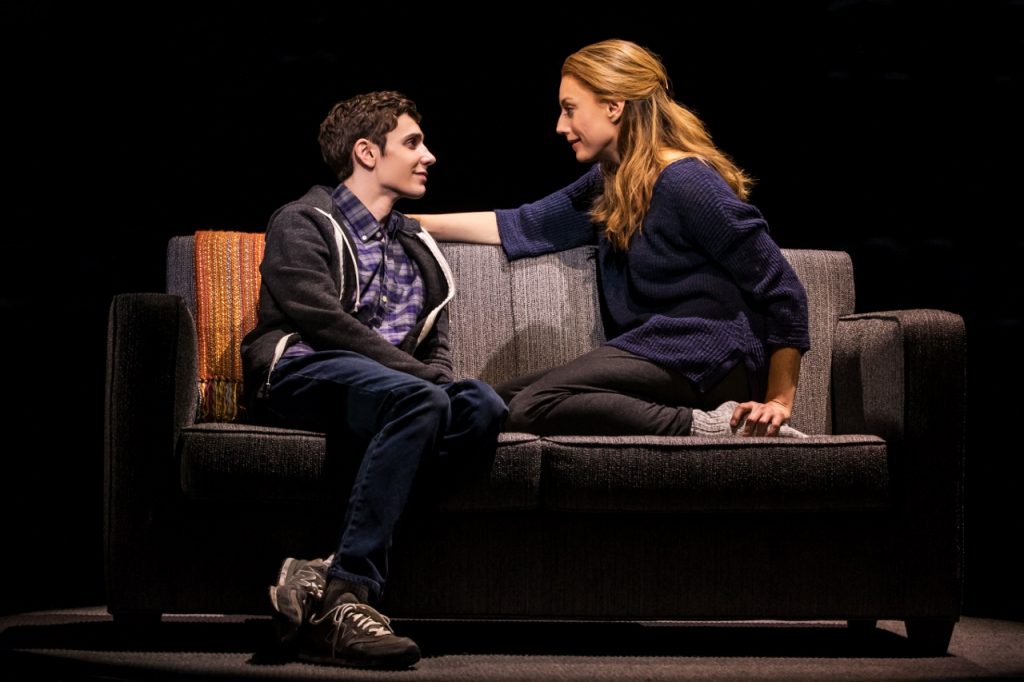

{ 3 comments… read them below or add one }
Tony — I agree with MOST of your review, with the exception that I consider Dear Evan Hansen to be the best musical score addressing teen angst since Spring Awakening. My greatest issues with this national tour are with some of the character’s interpretations. While Ben Levi Ross does deliver a moving performance, his “Evan” surrenders to his quirks and phobias too easily. While Ben Platt’s iconic heartbreaking “Evan” was bravely fighting to appear “normal” — only to repeatedly fail, it endeared him to us immediately. Not so much Mr. Ross. (Although he does sing spiritedly, especially in the second act once his voice is warmed-up.)
Marrick Smith’s “Connor” looks way too physically robust and healthy to be considering suicide. Skip the gym, Marrick — and skip a few meals and a few night’s sleep. Look more “at risk.” Right now, you’re too adorable.
Same note for Jessica Philips as Evan’s mother: She’s supposedly a single mother so overwhelmed that she’s lost contact with her only son. “Heidi Hanson” as created on Broadway by the brilliant Bay Jones came on stage looking frazzled, barely enough time to comb her hair. Both she and Evan are struggling to make sense of their lives. In this tour, Ms. Jones comes onto the stage looking as if she’s spent 2 hours in hair and make-up — no wonder she’s lost touch with her son — she’s too concerned with her appearance to notice. Wrong choice as it makes us question the character’s priorities. It isn’t until the second act that we get where she’s coming from.
While Steven Sater won a Tony for his issue-packed book of Spring Awkening, Cris, I chalk that up to the choice dialogue from his source material, the far-superior 1892 German play by Frank Wedekind (which admittedly is well-spliced by Sater).
But he also picked up another Tony for his esoteric, prosaic, pseudo-poetic, convoluted lyrics, packed with schizophrenic rhyming. I’ve actively listened to those lyrics time and again, and still, many are so dense that my brain simply can not process them. Another problem with the impenetrable lyrics, however thematically universal, is that they are not character defining.
Fortunately for Sater, the coffee-house rock music is brilliantly orchestrated by composer Duncan Sheik; while occasionally overblown and inaccessible, the score contains some soul-searching melodies, and is haunting, raw, and driving.
You are correct, Cris, in that Dear Evan Hansen may just be the best musical score addressing teen angst since Spring Awakening, but that’s like saying the best score since Flahooley is Bajour. So sad.
Still, except for the musicalization of teen angst, there’s no comparison. Spring Awakening just pricked up your senses while Dear Evan Hansen, regardless of the score, punches a hole through your soul.
And I agree that something was off in the casting, especially the moms; they both seemed more exaggerated than necessary. Since reviewers were placed in the back of the theater (so that celebs could get the best seats), it becomes a bit tough to pin down acting when you can’t even see their eyes. That may have been another reason this production didn’t hit you in the solar plexus the way it did on Broadway.
I accept your dare not to get misty-eyed. I think Evan is a self-pitying, sociopathic twat who should have gone to prison. Ugly cynicism dressed up as uplifting twaddle.
It does capture the moment, but then all is forgiven. I’m all for exploring the darkness and dishonesty beneath much of the viral uplift that gets posted, but for me, there have to be consequences — I don’t mean the “bad” guy has to pay, but that he has to be more affected by what he’s done than saying, “I’m really really really sorry.”
I would have bought it more if he has to live with the realization that what he has done can never be revealed, and his relationship with both families and with Zoe will now and forever be a lie. And he accepts it. Or doesn’t care. THAT would truly capture this hideous moment in our culture.
It’s funny, I think you’re absolutely right about the strength of the dialogue and the events in the book. What kills it for me is the refusal by the creative team to accept just how horrifyingly damaging what Evan does will be. To me, confessing to the the family is all about him — with no sense of human concern for them. Everyone is so overwhelmingly selfish. When he confesses to his mom she immediately forgives him and sings about what SHE feels. Um, maybe she could deal with the monstrous neediness of her son and the permanent damage he caused.